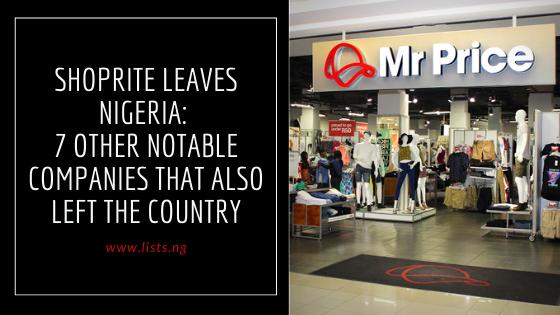Africa’s biggest grocery retailer and the South Africa-owned chain of stores, Shoprite, has announced its exit from Nigeria after 15 years.
The decision came after the company re-evaluated its operating model not just in Nigeria, but across Africa. A statement from the company read “Following approaches from various potential investors, and in line with our re-evaluation of the group’s operating model, in Nigeria, the Board has decided to initiate a formal process to consider the potential sale of all, or a majority stake, in Retail Supermarkets Nigeria Limited, a subsidiary of Shoprite International Limited,”
The company had reported drop in annual earnings and in April, Nairametrics reported that Shoprite Holdings in Nigeria lost 8.1% of its sales in constant currency terms at the end of the second half of 2019 following September’s Xenophobic attacks and reprisals back in Nigeria.
Problems like challenging trading conditions, store closures, load shedding, and currency devaluations have also been attributed to this movement.
This isn’t the first time companies, particularly those from South Africa have left Nigeria. Multinational companies such as HSBC and Etisalat have both packed up and left for different reasons.
Below are 7 notable companies that left Nigeria in recent times.
Mr Price
Mr Price Group Ltd., a retail company that specialises in apparel, as well as homeware and sportswear, announced in June 2020 that it is closing its Nigerian business. Having scrutinized all its markets to decide whether they can build scale on each investment and if they “warrant the time, finances and resources,” they decided to close up shop in Africa’s most populous country. Mr Price has already shuttered four of its five Nigerian stores and expects to close the last one in the coming months.
Woolworths
In December 2011, High-end South African supermarket chain Woolworths entered Nigeria with three stores. Two stores were opened in Lagos, one at The Palms and the other at Ikeja, while the third store was opened at Polo Park in Enugu State in Nigeria. The venture was lauded as a promising investment by Woolworths executives who were pleased with the growth prospects of the Nigerian market. Fast Forward three years later and the company was packing its bags and leaving the country. By November 2014, Woolworths claimed that its investment in Nigeria was no longer viable. They explained in a statement that high rental costs and duties and complex supply chain processes made trading challenging in the country. They further stated that given that the company could not see these circumstances changing in the medium term, the investment was deemed no longer viable.
Etisalat
1n July 2017, Abu Dhabi’s Etisalat has terminated its management agreement with its Nigerian arm. All UAE shareholders of the company exited and left the board and management of the Nigerian brand. The decision was made by the telecommunications networks after it’s $1.7bn loan talks collapsed. All UAE shareholders of the company exited and left the board and management of the Nigerian brand.
HSBC and UBS
On November 2, 2018, the Central Bank of Nigeria announced that British multinational banking HSBC, and Swiss multinational investment bank, UBS were closing their representative offices in Nigeria. No official reasons were given for their exit but, two schools resonated across the country. Firstly, following the bank’s statement that the Buhari administration was set to doom Nigeria economically, the government replied, accusing them of being channels for siphoning Nigeria’s funds by most of our corrupt politicians into foreign financial vaults ultimately leading to their exits. Secondly, there were those who blamed their departure on Nigeria’s bad economic situation and the fall of Nigeria Foreign Direct Investment (FDI).
Tiger Brands
Tiger Brands entered Nigeria, in 2012, and bought a 63% stake in struggling Lagos Flour Mills from billionaire Aliko Dangote for $182 million. The acquisition was part of a board-driven expansion across the continent. Unfortunately for Tiger Brands and its executives, there wasn’t a full understanding of the difficulty in operating the mills, nor the complications of the Nigerian market. Three years later, in 2015, the company was sold back to Dangote, suffering a $120 million write off.
Truworths
In 2016, Truworths closed its Nigerian stores and left the country totally. The exit of the fashion retail company was attributed to strict regulation of stock imports and rising costs imposed by the Nigerian government, which made it too difficult for the South African retailer to operate in Africa’s biggest economy. Chief Executive Officer of the company, Michael Mark stated that,“The regulations were making it extraordinarily difficult to get stock into the stores,” Mark said. “We can’t get money out, so there was no point any longer.”






